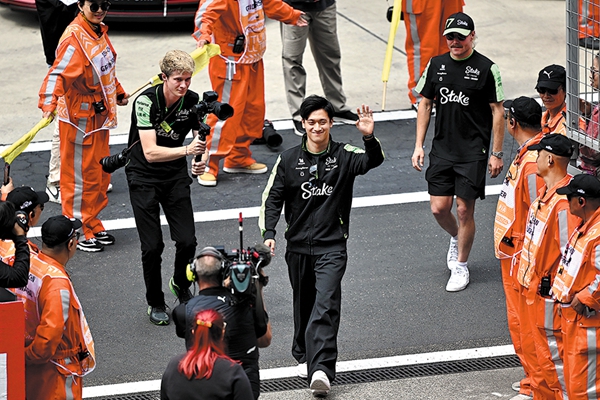
Chinese Formula One driver Zhou Guanyu waves to the crowd ahead at the race of the Chinese Grand Prix at the Shanghai International Circuit on Sunday. WEI XIAOHAO/CHINA DAILY
As the Shanghai International Circuit hosted the 20th Formula One Chinese Grand Prix over the weekend, all eyes were on 25-year-old local hero Zhou Guanyu, China's first-ever F1 driver and the first Chinese driver to complete a home race.
"Without the Shanghai circuit, there would be no start to my dream," said Zhou. It was here in 2005 that 6-year-old Zhou witnessed the thrill of F1 racing for the first time, watching in awe as Fernando Alonso of Renault blasted across the finish line to take victory. "I wouldn't be standing on the grid 20 years later if not for this race putting China on motorsport's map."
That day birthed an obsession that quickly accelerated. By age 8, Zhou's go-kart skills propelled him onto an elite international level, and he went abroad to hone his craft thanks to his victory at the 2010 national karting championship.
He won the 2018 FIA F3 European Championship race in Pau, France, and joined the Renault Sport Academy in 2019. His record-setting Asian F3 and F2 titles drew Zhou closer to F1. In 2021, Zhou would become Alfa Romeo's F1 race driver for 2022, becoming the first-ever Chinese driver to compete at the pinnacle of motorsports.
For this year's Chinese Grand Prix, Zhou had a special helmet designed to pay homage to Shanghai, emblazoned with the city's metro map and landmarks like the Oriental Pearl Tower.
"These are what I want to highlight. I'm a Chinese driver from Shanghai. I want the growth of Chinese motorsports to be seen by everyone," Zhou said.
As the grandstands erupted with chants of "Zhou Guanyu! Zhou Guanyu!", the young driver achieved another milestone — becoming the first Chinese driver to finish his home Grand Prix by taking 14th.
"I've waited for this moment!" Zhou cried. It was only the second time he had cried in a decade, according to him. The first was when that life-altering call came to join F1.
For Zhou, this homecoming represented a pit stop on the road to greater destinations. "I believe that when I return to China again next year, the year after, and the year after that, I will certainly be even better than I am now," he said.
As a rising star, Zhou's impact has reverberated far beyond the circuit. Recognizing Zhou's meteoric success, Shanghai officially named him an international tourism ambassador on April 21.
Shanghai is an important window showcasing Chinese culture globally, said Fang Shizhong, the city's tourism chief, after giving Zhou the designation. "Shanghai will provide a better tourism image to the world and interpret how wonderful the city is to show international visitors."
A documentary about Zhou has also hit cinemas, chronicling his evolution from a boy immersed in motorsport to becoming China's popular F1 star. Following the premiere in Jiading district, Zhou was appointed as a promoter for the International Auto Culture Festival, which celebrates the convergence of automobile culture, heritage and innovation.
The soaring popularity of F1 racing has attracted diverse commercial partners well beyond just automakers and tourism. Tech giants such as Lenovo, Xiaomi and ByteDance's TikTok have all aligned with F1's rise in the Chinese market as they recognize the marketing potential of China's ascent in motorsports.
"I will keep promoting motorsports in the hope that more people will recognize the appeal of racing and develop an interest in it. In the future, I hope to see more Chinese drivers become members of the global racing community," said Zhou.

